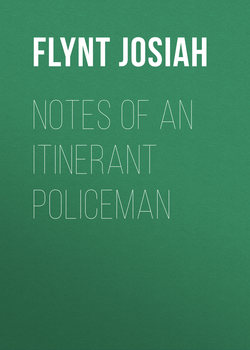Notes of an Itinerant Policeman

Реклама. ООО «ЛитРес», ИНН: 7719571260.
Оглавление
Flynt Josiah. Notes of an Itinerant Policeman
INTRODUCTORY
CHAPTER I. WHO CONSTITUTE OUR CRIMINAL CLASSES?
CHAPTER II. THE PROFESSIONAL CRIMINAL
CHAPTER III. THE BUSINESS OF PICKING POCKETS
CHAPTER IV. HOW SOME TOWNS ARE "PROTECTED."
CHAPTER V. A PENOLOGICAL PILGRIMAGE
CHAPTER VI. A NEW CAREER FOR YOUNG MEN
CHAPTER VII "GAY-CATS."
CHAPTER VIII. THE LAKE SHORE PUSH
CHAPTER IX. HOW TRAMPS BEG
CHAPTER X. THE TRAMP'S POLITICS
CHAPTER XI. WHAT TRAMPS READ
CHAPTER XII. POLICING THE RAILROADS
Отрывок из книги
For a number of years it had been a wish of mine to have an experience as a police officer, to come in contact with tramps and criminals, as a representative of the law. Not that I bore these people any personal grudge, or desired to carry out any pet policy in dealing with them; but I had learned to know them pretty intimately as companions in lodging-houses and at camp-fires, and had observed them rather carefully as prisoners in jails, and I was anxious to supplement this knowledge of them with an inquiry in regard to the impression they make on the man whose business it is to keep an official watch over them while they are in the open. I desired also to learn more concerning the professional offender than it had been possible for me to find about him in tramp life. If one has the courage to go and live with professional criminals as one of them, he can become even more intimate with them than in a police force, but it is very difficult to associate with their class long and not be compelled to take an active part in their criminal enterprises, and my interest in them was not so great that I was prepared to do this. I merely wanted to know how strong they are as a class, in which sections of the country they are the most numerous, whether they have peculiar characteristics differentiating them in public thoroughfares from other types of outlaws, how they live, and what is the general attitude toward them of our police and prison authorities. Partial answers to these questions I had been able to get in Hoboland, but I was anxious to fill them out and get any new facts that would throw light on the general situation.
During the spring and summer of last year (1899) it was possible for me to have a police officer's experience. The chief of a large railroad police force gave me a position as a patrolman, and, in company of two other officers, I was put on a "beat" extending over two thousand miles of railroad property. The work we were given to do was somewhat of an innovation, but it afforded me an excellent opportunity to secure the information I desired. For two months and a half, which was the extent of my connection with the undertaking and with the force, we had to travel over the property, protecting picnic trains, big excursions, passengers travelling to and from towns where circuses were exhibiting, and the ordinary scheduled traffic, whenever there was reason to believe that pickpockets and other thieves were likely to put in an appearance.
.....
The professional criminal, or the habitual offender, as he is called by some, comes next in numerical strength, but first of all, in my opinion, in importance. I consider him the most important because he frankly admits that he makes a business of crime, and is prepared to suffer any consequences that his offences may bring upon him. It is he who makes crime a constant temptation to the occasional offender, and it is also he with whom we have the most trouble in our criminal courts; he is almost as hard to convict as the man with "political influence." On my "beat" he was more in evidence, in the open at least, than any of the other offenders mentioned, except the tramp, but, as I stated, the warm months are the time when he comes out of his hiding-places, and it was natural that I should see a good deal of him.
My fifth category is made up of what a friend calls "the unknown thief," whom he considers the most dangerous and despicable of all. He means, by the unknown thief, the man in official life, or in any position which permits of it, who protects, for the sake of compensation, the known thief. "If you will catch the unknown thief," he has frequently said to me, "I will contract to apprehend and convict the known," and he believes that until we make a crusade against the former, the latter is bound to flourish in spite of all our efforts. He sees no use, for instance, in spending weeks and sometimes months in trying to capture some well-known criminal, as long as it is possible for the man to buy his freedom back again, and it is his firm belief that this kind of bargaining is going on every day.
.....